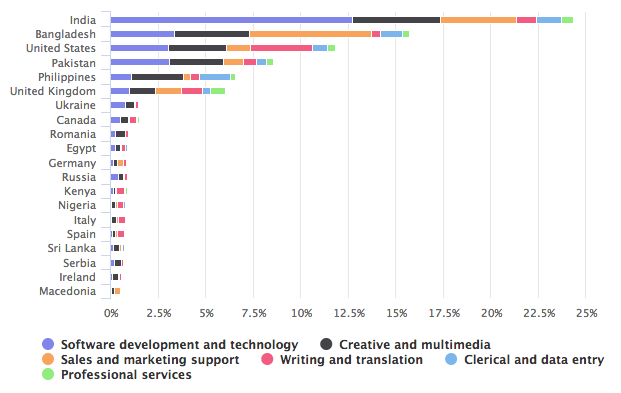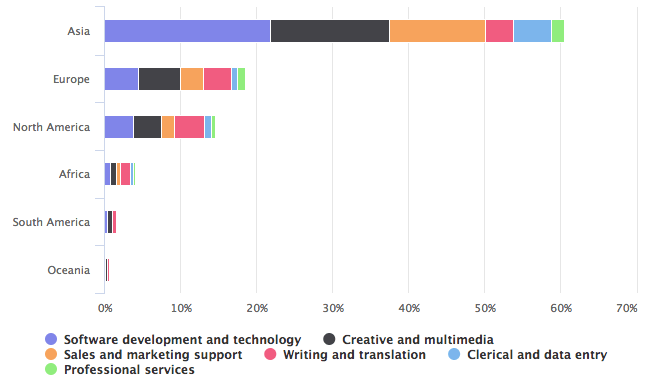The Internet has created a global market for digitally delivered freelance work, which is currently growing rapidly. The new Online Labour Index worker supplement of Oxford University reveals what skills different countries are bringing to the market. For instance, the top occupational category in the United States is writing and translation, while in the Indian subcontinent it is software development and technology. European regions focus on different categories. The map is based on real time data from four of the largest platforms connecting buyers and sellers of online freelance work.
India is the traditional labour outsourcing destination for online labour accounting for 24 per cent of the total labour, according to Online Labour Index worker supplement study by the Oxford Internet Institute. Bangladesh is the second largest supplier of online labour, says a recent report, analysing data from e-platforms connecting freelancers with employers.
India is followed by Bangladesh (16 per cent) and US (12 per cent), according to the report.
India, Bangladesh are followed by US, Pakistan, Philippines and the UK in what is being termed "digital gig work" or freelance work offered online.
Oxford Internet Institute of the University of Oxford published the report last week.
The software development and technology category is dominated by workers from the Indian subcontinent, who command a 55 per cent market share.
While software and technology services was the top sector for India, creative and multimedia services came second, and sales and marketing support was the third most popular online labour sector for the country.
India is followed by Bangladesh (16 per cent) and US (12 per cent), according to the report.
India, Bangladesh are followed by US, Pakistan, Philippines and the UK in what is being termed "digital gig work" or freelance work offered online.
Oxford Internet Institute of the University of Oxford published the report last week.
The software development and technology category is dominated by workers from the Indian subcontinent, who command a 55 per cent market share.
While software and technology services was the top sector for India, creative and multimedia services came second, and sales and marketing support was the third most popular online labour sector for the country.
The Online Labour Index worker supplement is collected from four of the largest online labour platforms, also known as online freelancing or online outsourcing platforms: Fiverr, Freelancer, Guru, and PeoplePerHour. As these are English-language platforms, non-English-speaking countries’ market shares are likely to be underrepresented in the figures. Many platforms exist in other languages, but English-language platforms are the main conduits of international trade. Based on traffic statistics, we can estimate that these four sites represent at least 40 percent of the global market for platform-based online work. The figures are thus likely to give a reasonably good indication of the overall countours of the market, and especially of what skills different countries bring to the global market.
Europe’s regions show a distinct geographic skill pattern. In Latin Europe the leading online work category is writing and translation, while North Europe provides creative and multimedia work as well as sales and marketing support. Large East European countries are strongest in software development and technology, which is consistent with the fact that they are also significant destinations for traditional technology outsourcing.
Workers from Internet-savvy countries in Sub-Saharan Africa, such as Nigeria, Kenya, and South Africa, can also be seen participating in the market. They are especially active in writing and translation work, with a global market share in that category of about 6 percent. The second largest category in Kenya is software development and technology work. Kenya’s global market share in this category of online freelance work remains small, however, at less than half a percent.
"Based on traffic statistics, we can estimate that these four sites represent at least 40 per cent of the global market for platform-based online work.



0 comments:
Post a Comment